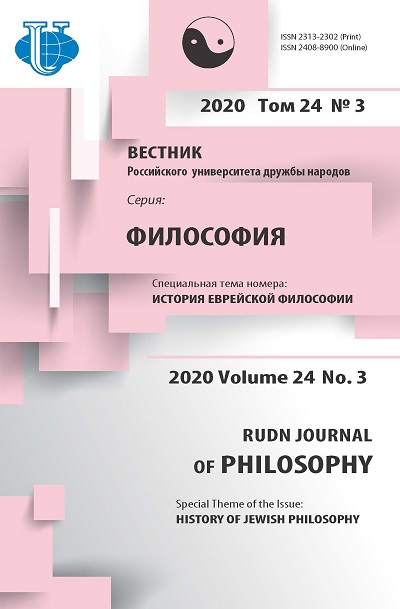M. Schlick's Existentialism? Moritz Schlick and His Ethics of Youth
- Authors: Davletshina A.M.1
-
Affiliations:
- Ural Federal University
- Issue: Vol 24, No 3 (2020): HISTORY OF JEWISH PHILOSOPHY
- Pages: 445-456
- Section: PHILOSOPHY OF LIFE AND EXISTENTIAL PHILOSOPHY
- URL: https://journals.rudn.ru/philosophy/article/view/24357
- DOI: https://doi.org/10.22363/2313-2302-2020-24-3-445-456
- ID: 24357
Cite item
Full Text
Abstract
The article analyzes the little-known field of philosophical studies of M. Schlick, who was traditionally considered as a scientist dealing with the problems of epistemology and philosophy of science. In the spotlight of the research is the work “On meaning of Life” (“Vom Sinn des Lebens”, 1927), where the philosopher not only lays the foundation for his future work on ethics but also offers an original approach to the problem of the meaning of life, linking it with the concept of "youth". He notes that most people see the meaning of life in achieving certain goals. As a result, life is filled with activities aimed at preserving existence. The only way to find meaning in life is through an activity that has a purpose and value in itself, so the meaning of life cannot be found in work since it is not an activity for its own sake. The alternative is the game inherent in youth. It fills you with joy and gives value to life. The meaning of life symbolizes youth. You can be “young” at any time if you consider youth as a time of play, activity and creativity. It implies the requirement to change the conventional system of upbringing and conservative ethics. In particular, he insists that it is necessary to abandon the ethics of duty and replace it with new ethics, where the virtue is serene, does not suffer from the pressure of duty and freely unfolds of its own will. It is concluded that Schlick's “ethics of youth” is symptomatic of the first third of the twentieth century since those times were oriented to the “new man”, whose universal traits were health, cheerfulness, fortitude and social activism.
About the authors
Anna M. Davletshina
Ural Federal University
Author for correspondence.
Email: a.m.davletshina@urfu.ru
assistant of the Department of History of Philosophy, Philosophical Anthropology, Aesthetics and Theory of Culture
Mira 19, Ekaterinburg, Russian Federation, 620002References
- Carnap R, Hahn H, Neurath O. Nauchnoe miroponimanie — Venskij kruzhok [The Scientific Conception of the World: The Vienna Circle]. Logos. 2005; 2(47):13—26. (In Russian).
- Schlick M. Filosofiya i estestvoznanie [Philosophy and natural science]. Epistemology & Philosophy of Science. 2004; 1(1):213—226. (In Russian).
- Kraft V. Venskiy kruzhok: vozniknovenie neopozitivizma [Vienna circle: the emergence of neopositivism]. Moscow. Ideya-Press; 2003. 217 p. (In Russian).
- Schlick M. Povorot filosofii [The Turning Point in Philosophy]. In: Analiticheskaya filosofiya. Izbranny`e teksty`. Moscow. Izd-vo Moskovskogo universiteta; 1993. P. 28—33. (In Russian).
- Schlick M. Pozitivizm i realizm [Positivism and realism]. In: Zhurnal «Erkenntnis» («Poznanie»). Izbrannoe. Moscow. Id «Territoriya Budushhego», Ideya-Press; 2006. P. 283—309. (In Russian).
- Schlick M. Voprosy` e`tiki [Problems of Ethics]. Logos. 2008; 1(64):188—206.
- Schlick M. Fragen der Ethik. Frankfurt am Main, Suhrkamp Verlag; 1984. 208 S.
- Schlick M. Von Sinn des Lebens. Symposion. Philosophische Zeitschrift für Forschung und Aussprache. Jg.1. 1927. S. 331—354.
- Marx K. E`konomichesko-filosofskie rukopisi 1844 g. [Economic and Philosophic Manuscripts of 1844]. E`konomichesko-filosofskie rukopisi 1844 goda i drugie rannie filosofskie raboty`. Moscow. Akademicheskij proekt; 2010. p.303—358. (In Russian).
Supplementary files















